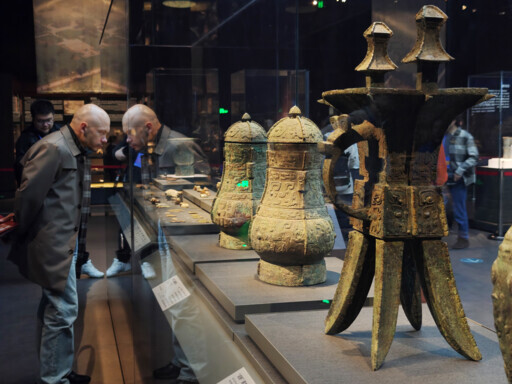


Conference stresses modern value of classics

A scholar observes artifacts during the exhibition “Origins of Chinese Civilization from an Archaeological Perspective,” a side event of the first World Conference of Classics, at the Chinese Archaeological Museum in Beijing on Nov. 6. Photo: Lyu Jiazuo/CSST
More than 600 experts, scholars, cultural luminaries, youth representatives, and ambassadors to China from over 30 countries and regions worldwide convened in Beijing for the first World Conference of Classics, which was held on Nov. 7–8. Chinese President Xi Jinping and Greek President Katerina Sakellaropoulou each sent a congratulatory letter to the conference.
Themed “Classical Civilization and the Modern World,” this grand academic gathering aimed to promote global cultural exchanges, advance mutual learning among civilizations, and deepen classical studies.
In her written address to the opening ceremony, Director-General of UNESCO Audrey Azoulay lauded the conference as a bridge for exchanges on classical cultures around the world, noting that great works by ancient sages, from the Book of Songs [Shi Jing] to the Trojan Epic and from Laozi’s Tao Te Ching [Dao De Jing] to Aristotle’s Nicomachean Ethics, continue to influence contemporary thought and emotional experience.
Theodoros Papangelis, head of the Delegation of the Academy of Athens in Greece, highlighted the classical tradition’s unique and extraordinary influence on shaping the modern world. Whether in China or Greece, classics has deeply penetrated people’s cultural conceptions as a lasting and powerful force.
Manolis Korres, Member of the Academy of Athens (Section of Letters and Fine Arts), examined the definition and extension of classics, as well as the importance of classics in modern education. He emphasized that over the past centuries, classical studies have extended to a wide range of fields, encompassing epigraphy, papyrology, linguistics, ancient art history, archaeology, etc. These studies are critical to understanding Chinese culture.
Hans van Ess, vice president for research, chair at the Institute for Sinology, and a professor from the Ludwig-Maximilians-Universität München in Germany, shed light on the cooperation between China and Europe in classical studies and the role of Chinese classics in global classics. In his opinion, Chinese classics offers a valuable model for refining the definition of “classics.”
In the United Kingdom, classics represents a field, involving not only literature, but also studies of every aspect of the ancient Greek and Roman eras, van Ess said. Chinese classical literature is exemplary in that it has exerted far-reaching influence on the development of Chinese language, as many proverbs originate from classical documents. This is the primary criterion for defining classics, he asserted.
Martin Kern, a professor in Asian Studies from the Department of East Asian Studies at Princeton University in the United States, shared his views on the various academic worlds across the globe, underscoring the importance of comparative classics. He observed that China’s rich cultural heritage can offer novel perspectives for global ancient history research, while enhancing mutual understanding and inspiration.
Liu Xiaofeng, president of the Classical Studies Association at the Chinese Association of Studies of Foreign Literature, and a professor from the School of Liberal Arts at Renmin University of China, reviewed the evolution of classics and its relevance in the modern world.
He noted that pre-Qin (prior to 221 BCE) Chinese philosophers advocated for tailoring governance approaches to the changing times, while many ancient Greek and Roman classical writers compared the past and the present in similar ways. Both Chinese and Western classics ought not to be merely studies of the past; instead, they should serve contemporary society by bridging historical and modern perspectives, taking on the historical mission of integrating past wisdom with present needs.
At the opening ceremony, the establishment of the Chinese School of Classical Studies at Athens was announced. Launched by the Chinese Academy of Social Sciences (CASS), and with the support of the Chinese and Greek governments, the school is committed to conducting archaeological excavations and classical studies, building an archaeological library, publishing an academic journal, organizing academic events, launching research programs, and hosting exhibitions.
The conference was co-organized by CASS, the Ministry of Education and the Ministry of Culture and Tourism of China, as well as the Ministry of Culture of Greece and the Academy of Athens. During the two-day event, attendees engaged in in-depth discussions and open dialogue on such topics as “The Logos and Spirit of Classical Civilizations,” “Translation and Interpretation of Classics,” “Classical Philology and Classical Traditions,” “Classical Studies and Mutual Learning between Civilizations,” “Classics and Chinese Historiography,” “An Ethical Dialogue between Confucianism and Ancient Greek Philosophy,” “Classical Wisdom and the Age of Digital Intelligence,” and “Classics and the Future of Humanity.”
Editor:Yu Hui
Copyright©2023 CSSN All Rights Reserved